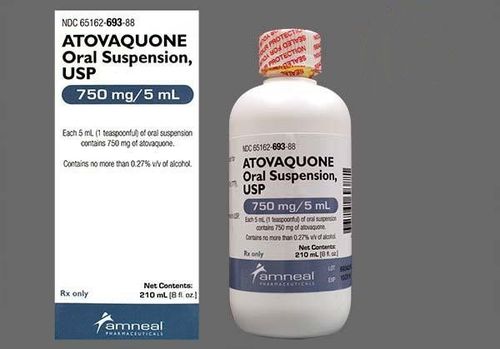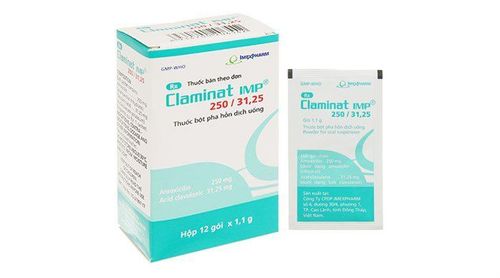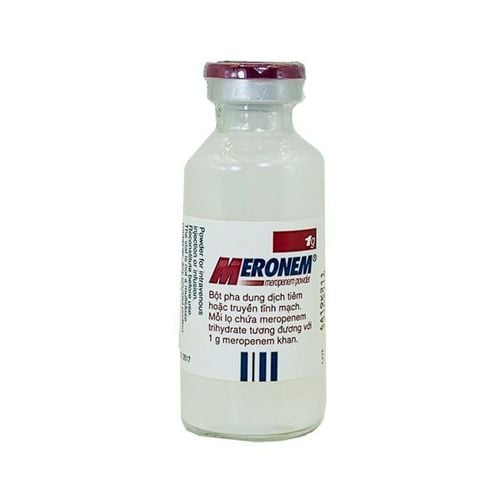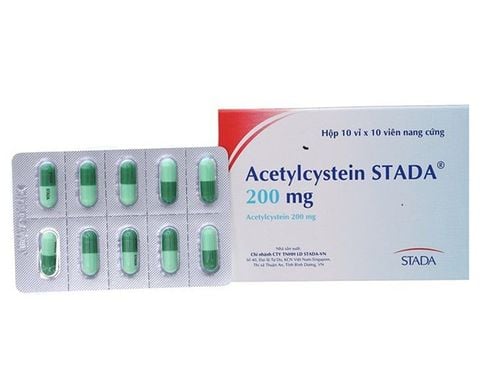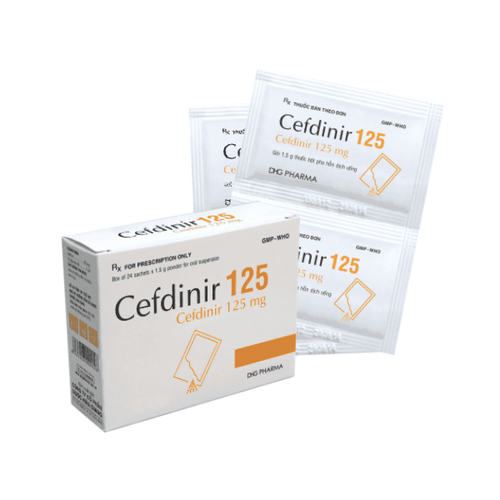This is an automatically translated article.
Cefdinir 300mg contains the active ingredient Cefdinir - a 3rd generation cephalosporin antibiotic, indicated in the treatment of mild to moderate infections caused by susceptible groups of bacteria. Let's learn about the dosage and notes when using Cefdinir 300mg through the article below.1. Uses of Cefdinir 300mg
Cefdinir 300mg is indicated in the following cases:
Adults and adolescents:
Pneumonia caused by Haemophilus Parainfluenzae, Haemophilus influenzae, Streptococcus Pneumoniae; Chronic bronchitis caused by Haemophilus Parainfluenzae, Haemophilus Enzae, Moraxella Catarrhalis, Streptococcus Pneumoniae; Tonsillitis , pharyngitis caused by Streptococcus Pyogenes; Uncomplicated skin structure infections caused by Streptococcus Pyogenes, Staphylococcus. Children:
Acute otitis media caused by Streptococcus Pneumoniae, Haemophilus Enzae; Tonsillitis, pharyngitis caused by Streptococcus Pyogenes; Skin structure infections caused by Streptococcus Pyogenes, Staphylococcus Aureus. It is indicated for the treatment of infections caused by bacteria and has no effect on infections caused by viruses (flu or common cold).
2. Dosage and how to use Cefdinir 300mg
2.1. Cefdinir dosage belongs to the group of prescription drugs, so the use of the drug in treatment needs to be prescribed by the treating doctor. All information about the recommended dosage below is for reference only, patients absolutely do not use the drug without a doctor's prescription. The recommended dosage of Cefdinir 300 is as follows:
Pneumonia: Adults and children 13 years of age and older take 300 mg every 12 hours, the duration of drug therapy is about 5 – 10 days (or 600 mg every 24 hours). hours in 10 days).
Acute sinusitis:
Adults: Take 300mg of Cefdinir every 12 hours or 600mg every 24 hours for a period of 10 days; Children 6 months – 12 years: Oral 7mg/kg every 12 hours or 14mg/kg every 24 hours for 10 days (maximum dose 600mg/day) Uncomplicated skin structure infections:
Adults: Take 300mg of the drug every 12 hours for a period of 10 days; Children from 6 months to 12 years old: Take 7mg/kg every 12 hours for 10 days (maximum dose 600mg/day). Tonsillitis, pharyngitis:
Adults: Take 300mg of medicine every 12 hours for 5-10 days or 600mg of medicine every 24 hours for 10 days; Children 6 months - 12 years old: Take 7mg/kg drug every 12 hours for 5-10 days or 14mg/kg drug every 24 hours for 10 days (Maximum dose is about 600mg/day). Acute otitis media:
Children from 6 months to 12 years of age: Take 7mg/kg of drug every 12 hours for 5 to 10 days or 14mg/kg of medicine every 24 hours for 10 days (Maximum dose is 600mg/day). Chronic bronchitis: Adults and children over 3 years of age take 300mg every 12 hours for 5 to 10 days or 600mg every 24 hours for 10 days.
Dosage needs to be adjusted in patients with renal impairment: Specifically, adults with renal failure with creatinine clearance less than 30mL/min should take a dose not exceeding 300mg/day, children with renal failure have small creatinine clearance. more than 30mL/min at a dose of 7mg/kg every 24 hours.
2.2. How to take Cefdinir is taken orally, with or without food (the dose can be taken once or in 2 divided doses every 12 hours).
The dose used is based on the patient's medical condition and response, the recommended dose is 600mg/day in adults.
The effectiveness of the drug is highest when the concentration is maintained at a stable level. Therefore, patients should take Cefdinir at certain intervals. Continue using the medicine until the end of the course of treatment prescribed by your doctor, even if the symptoms disappear after a few days of treatment. Stopping medication too soon can cause bacteria to continue to grow, leading to a recurrence of the infection and an increased risk of drug resistance.
3. Side effects of Cefdinir 300mg
Cefdinir 300mg may cause some side effects as follows:
Common: Skin rash, Candida skin infections, diarrhea, yeast infections in the vagina and vulva, headache, nausea , inflammation or infection of the vagina, stomach cramps, vomiting; Uncommon: Indigestion, bloating; Rare: Anaphylaxis, Stevens-Johnsons syndrome, serum sickness reactions, acquired hemolytic anemia, leukopenia, drug-induced aplastic anemia, erythema multiforme, convulsions, hearing disturbances , vaginal discharge, constipation, dizziness, itching, dry mouth, trouble sleeping.
4. Notes when using Cefdinir 300mg
4.1. Contraindications Contraindicated to use Cefdinir 300mg in the following cases:
Patients with hypersensitivity to any component of Cefdinir; Patients with diarrhea caused by Clostridium difficile infection; Patients with severe renal failure; People who are allergic to beta-lactams, cephalosporins. 4.2. Precautions for use Cefdinir should be used with caution in the following patients:
Patients with a history of hypersensitivity to penicillin group antibiotics; Patients with a predisposition to allergic reactions or family members with allergic reactions such as urticaria, rash or bronchial asthma; Patients with kidney disorders; Persons who are malnourished by oral route or needing parenteral nutrition, have a weak physical condition; Elderly: Treatment with Cefdinir in the elderly requires adjustment of the dose and dosing interval, based on the patient's condition and careful clinical judgment. Similar to other broad-spectrum antibiotics, long-term treatment with Cefdinir can lead to the development of multiple antibacterial strains. Patients should be carefully monitored if necessary. Intoxication occurring during treatment with Cefdinir requires appropriate supportive therapy.
Effects on the ability to drive and use machines: The drug does not affect the ability to drive or use machines.
Pregnant women, lactating women: There are no studies to determine the safety of the drug in pregnant and lactating women. Therefore, caution should be exercised when using Cefdinir in these subjects.
5. Drug interactions
The excretion of Cefdinir may be reduced when used with the following drugs: Aspartame, pravastatin, cefotiam, baclofen, liothyronine, doxycycline, indomethacin, digoxin, aminohippuric acid...
Above is important drug information. Cefdinir . Before using you should consult your doctor and read carefully before use to help the use of the drug bring good results.
Please dial HOTLINE for more information or register for an appointment HERE. Download MyVinmec app to make appointments faster and to manage your bookings easily.





